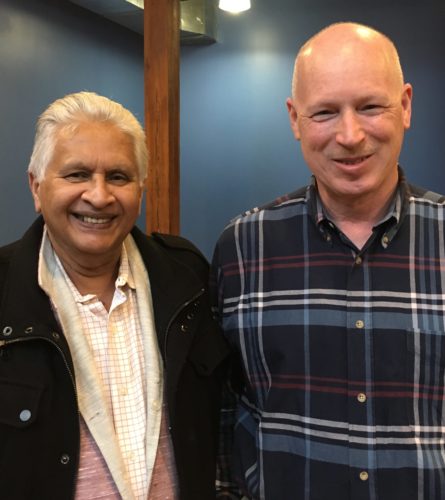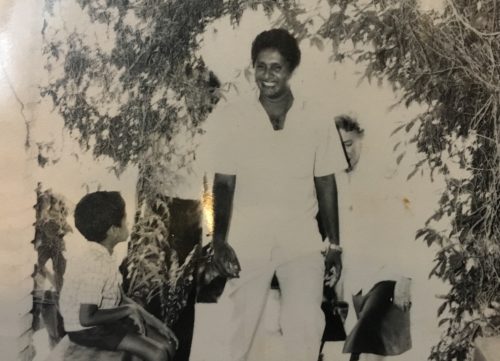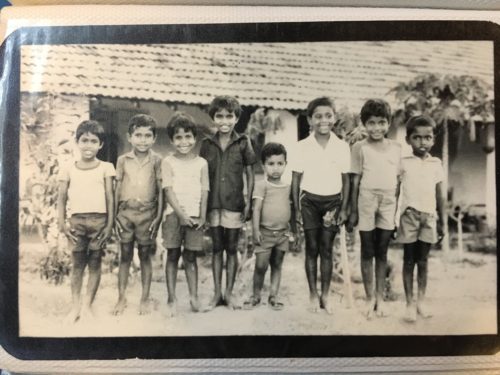When I received an email earlier this year from sponsor Laura DeCook about a bake sale fundraiser she was hosting, I was thrilled to hear about her efforts to help her sponsored child, Caroline*, beyond her monthly sponsorship contribution.
What I didn’t realize at the time was just how much more Laura was doing when it came to being involved in Caroline’s life — and the lives of other children as well.
I would soon find out that Laura had plans to fly from California to Kentucky to meet Caroline in person and that the donations she was collecting were going towards helping other children at Caroline’s school — those kids that don’t have sponsors like Laura yet.
I caught up with Laura to ask her about her sponsorship experience, her visit to Kentucky and how she feels about the power of sponsoring a child.
An interview with Laura DeCook
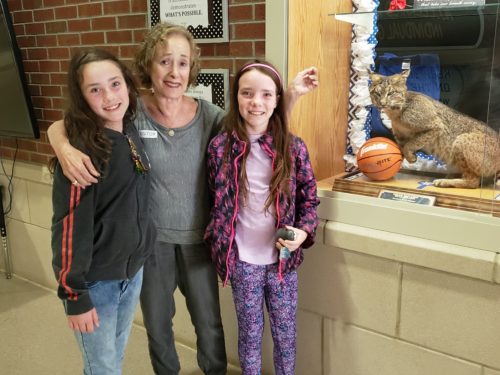
Laura’s mother accompanied Laura on her trip to Kentucky.
SC: Do you recall how you first got involved with sponsoring a child with Children Incorporated?
LD: Yes! I was going through a difficult time professionally and mentally, and someone told me about the book “Don’t Sweat the Small Stuff.”
I had been looking into organizations where I could give back and stop focusing so much on myself and looking at the bigger picture, which would make me feel more satisfied with my life.
When I read how much the author loved Children Incorporated, I did my research and loved what I saw. I immediately decided to sponsor a child most in need and was assigned to a very young boy, Elisandro, in Guatemala. He moved away about five years later, and I temporarily sponsored another boy until he too moved away.
I now sponsor the loveliest boy in Guatemala City, Danny, who is twelve years old. He writes the most eloquent letters I’ve ever seen a young boy write. I can tell he is going to be very successful one day.
SC: You sponsor a young girl in Kentucky named Caroline. What level of communication have you kept with her through your sponsorship? What has that communication meant to you and her?
LD: After sponsoring children in Guatemala for years, I decided I would like to sponsor another child in the U.S. — one that I could send packages to and maybe eventually meet in person more easily. Caroline was around eight years old when we first began writing to each other, and I loved seeing photos of her wearing the clothes I had picked out — including a cool jacket with the letter “C” on it.
“I’ll never forget Caroline trying to fit all of the clothing and art supplies I brought with me into her locker with a huge smile on her face.”
She wrote me really sweet letters every couple of months, always answering the questions I asked her in mine. She is eleven now, so it’s been quite a few years seeing her grow up in photos and the way she writes now, which is so much more mature.
SC: What was your motivation to host a fundraiser to provide additional support for the school where Caroline attends?
LD: One day, at the start of the summer, I was at the gym thinking about what I wanted to do for my birthday. Since parties aren’t a big deal to me anymore, I didn’t want my friends to feel obliged to go out and spend a lot of money.
I then had the idea that I would start a fundraiser to help out Caroline’s school through a PayPal money pool. I had decided by that time that I was going to visit her in Kentucky over Labor Day weekend so that I could tell her school’s Resource Coordinator about the donation in person. I was able to raise a great deal from generous friends quickly, but I wanted to go even higher.

Funds raised from Laura’s bake sale went to support children without sponsors at the school where Laura sponsors Caroline.
I then thought of another way to quickly fundraise — a bake sale at my company. Last year I had run a charity bake sale for a veteran’s organization over the 4th of July, so I thought, why not for Children Incorporated this year?
My company, Expedia Group, matches dollar-for-dollar to charitable organizations, so I knew I’d be able to raise quite a bit. After all was said and done, the bake sale raised about $700, and my friends donated the rest to make my total close to $1100. Expedia matched it, and the funds were given to the school and to three boys awaiting sponsorship there.
SC: That’s incredible! Can you tell us more about what your visit with Caroline was like for you?
LD: It was amazing. I still think about it all of the time. When Caroline and her sister, who is also sponsored through the Children Incorporated program, walked into the room, it was like a photo coming to life. Caroline was so excited she was shaking.
It only took about 15 minutes of conversation to feel a bond to her and her sister. We were soon laughing, talking about our lives, our pets, school, telling jokes, everything! What I thought would be one hour turned into close to three. The head of the school’s resource center, Angela, is a saint. She was such a wonderful host and had lunch waiting and answered every question I had about the girls’ lives before I met them. She showed me around her office, where she has neatly organized bins of clothing for children who come to school with dirty clothes or need an article of clothing. Getting to know her was just as much fun as meeting Caroline!
Caroline and her sister took Angela and me on a tour of their school before we said goodbye. I had tears in my eyes. I’ll never forget Caroline trying to fit all of the clothing and art supplies I brought with me into her locker with a huge smile on her face.
SC: Did you know much about Kentucky before your visit? What stood out to you?
“It is the best $35 a month anyone could spend. Children Incorporated and its sponsors are seriously changing lives.”
LD: I work in travel, so I had a general idea of the lay of the land and had read about Lexington and the beautiful horse farms and great food.
It was fun to see some of Kentucky a couple of days before I drove out to Appalachia, starting in Louisville, then to Lexington. The thing that stood out the most was the genuine Southern charm that everyone has. People were so down to earth and kind. It’s a huge change from so much of the Bay Area where everyone is always rushing from one place to another. In Kentucky, they seem to really slow down and enjoy life more.
The highlight of the sightseeing portion of the trip was going to a farm with retired horses that had run in the Kentucky Derby, some having made millions of dollars from their days on the track. I’m not a big supporter of horse racing but love how well the horses are now being taken care of in their old age!
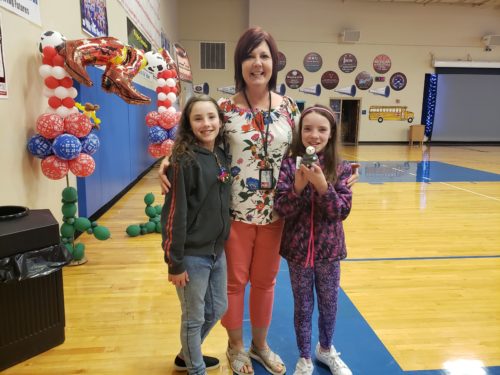
Angela is pictured with Caroline and her sister. Caroline’s sister is also in our sponsorship program.
SC: What would you tell someone else sponsoring a child who might be considering doing so themselves?
LD: It seriously has been the most rewarding experience. Connecting with a child who is lacking so much that others take for granted has been so humbling.
Seeing the huge smiles on their faces when I get pictures of them with new clothes and shoes sometimes makes me really emotional but in a good way. It is the best $35 a month anyone could spend. Children Incorporated and its sponsors are seriously changing lives.
*Names changed to protect the children.
***
How do I sponsor a child with Children Incorporated?
You can sponsor a child with Children Incorporated in one of three ways – call our office and speak with one of our sponsorship specialists at 1-800-538-5381, email us at sponsorship@children-inc.org, or go online to our donation portal, create an account, and search for a child that is available for sponsorship.
SPONSOR A CHILD





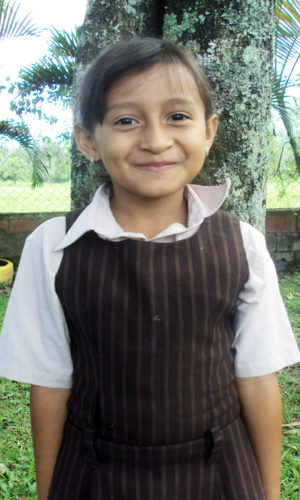
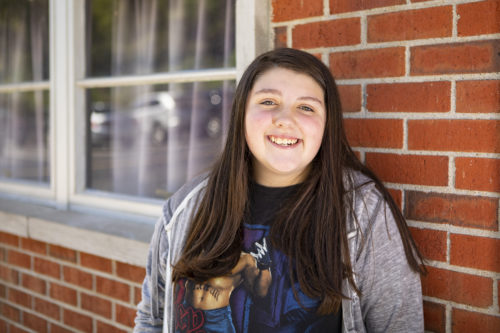 A place to feel at home
A place to feel at home